|
Ryan Claassen, Ph.D. – Associate Professor of Political Science at Kent State University |
| Friday December 5, 2014 12:30-1:30 p.m. Dampeer Room Kelvin Smith Library Case Western Reserve University Dear Colleagues: Observers of U.S. politics have noticed big differences in voting behavior between people who claim to be active in church and those who are not active; between those who claim to belong to a faith and those who do not; and between people of different faiths. In the 2012 exit polls, respondents who never attend religious services favored Obama by 62 to 34%. Those who attended more than weekly favored Romney by 63 to 36%. If one confines analysis only to white voters, the differences were even larger. We can trace religious divisions between the parties back to the nation’s founding – when the Federalists and then the Whigs were the “church” parties and the Jefferson and Jackson Democratic-Republicans were more congenial to those who liked to drink their whiskey and wanted to be left alone by the moralizers. But how strong is the religious divide, really? Professor Ryan Claassen will explain his more skeptical view, from his forthcoming book from Cambridge University Press. All best regards, About Our Guest Ryan Claassen teaches a variety of courses in the areas of quantitative research methods, American politics, and political behavior – at both the doctoral and undergraduate levels. His research spans several literatures including political participation, citizen competence, public opinion, election administration, religion and politics, interest groups, and racial and ethnic politics; however, the common thread is political engagement. In the broadest sense, he investigates whether engagement shapes the capacity of individuals and groups of individuals in the American public to effectively contribute to public opinion and compete democratically. Professor Claassen’s forthcoming Cambridge University Press book assesses campaign activism among religious and Secular partisans. Professor Claassen also has a book under advance contract with Yale University Press (with Steve Hook) exploring citizen competence in the realm of public opinion about foreign policy. His work has appeared recently in American Politics Research, The Journal of Politics, The Journal of Political Science Education, Political Behavior, Political Research Quarterly, and Public Opinion Quarterly. Where We Meet The Friday Public Affairs Lunch convenes each Friday when classes are in session, from 12:30 p.m. to 1:30 p.m. We usually meet in the Dampeer Room of Kelvin Smith Library. The Dampeer Room is on the second floor of the library. If you get off the elevators, turn right, pass the first bank of tables, and turn right again. Occasionally we need to use a different room; that will always be announced in the weekly e-mails. Parking Possibilities The most convenient parking is the lot underneath Severance Hall. We regret that it is not free. From that lot there is an elevator up to street level (labeled as for the Thwing Center); it is less than 50 yards from that exit to the library entrance. You can get from the Severance garage to the library without going outside. Near the entry gates – just to the right if you were driving out – there is a door into a corridor. Walk down the corridor and there will be another door. Beyond that door you’ll find the entrance to an elevator which goes up to an entrance right inside the doors to Kelvin Smith Library. Upcoming Programming The Friday Public Affairs Discussions will resume on January 16, 2015. As we work on creating the schedule for “Spring” semester, we will send out a preliminary version during the holiday break. 2015 will be the 80th anniversary of the passage of one of the most significant pieces of legislation in the nation’s history: the Social Security Act. Whether you see it as vital “social insurance’ or a threatening “entitlement,” we all should agree that any legislative changes to the program, as part of budget deficit politics or for other reasons, would be one of the most important results of the new Congress. Cleveland’s Center for Community Solutions invites you to reflect on the meaning and importance of those two words – “social security” – as you watch their new video, “America’s Social Contract: 80 Years of Social Security.” To view the video, click here. I will discuss Social Security at one of our early programs, though not necessarily January 16. Wishing all a healthy and happy holiday season and New Year. All best regards, |

